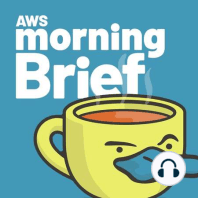17 min listen
Chef Gets Gobbled Up (Whiteboard Confessional)
ratings:
Length:
23 minutes
Released:
Sep 18, 2020
Format:
Podcast episode
Description
TranscriptCorey: This episode is sponsored in part by Catchpoint look, 80% of performance and availability issues don't occur within your application code in your data center itself. It occurs well outside those boundaries. So it's difficult to understand what's actually happening. What Catchpoint does is makes it easier for enterprises to detect, identify, and of course validate how reachable their application is. And of course, how happy their users are. It helps you get visible and to reach a bit availability, performance, reliability, of course, absorbency. Cause we'll throw that one in too. And it's used by a bunch of interns and companies you may have heard of like, you know, Google, Verizon, Oracle, but don't hold that against them. And many more. To learn more, visit www.catchpoint.com and tell them Cory sent you, wait for the wince.Welcome to the AWS Morning Brief: Whiteboard Confessional, now with recurring perpetual guest, Pete Cheslock. Pete, how are you?Pete: I'm back again.Corey: So, today I want to talk about something that really struck an awful lot of nerves across, well, the greater internet. You know, the mountains of thought leadership, otherwise known as Twitter. Specifically, Chef has gotten itself acquired.Pete: Yeah, I saw some, I guess you would call them, sub-tweets from some Chef employees before it was announced, which is kind of common, where responses ranged from, “Oh, that's something new,” to, “Welp.” And I've thought it—I was like, “Wow, that's interesting.” Of course, then I start looking for news of what happened, of which we all found out not long after.Corey: Before we go into it, let's set the stage here because it turns out not everyone went through the battles of configuration management circa 2012 to 2015 or so—at least in my experience. What did Chef do? What was the product that Chef offered? Who the heck are they?Pete: So, Chef, they were kind of a fast follower in the configuration management space to another very popular tool that I'm sure people have used out there called Puppet. Actually, interestingly enough, the founders of Chef ran a consulting company that was doing Puppet consulting; they were helping companies use Puppet. And both of those tools really came from yet another tool called CFEngine, which in many ways—depending on who you ask—it's kind of considered the original configuration management, the one that had probably the earliest, largest usage. But it was very difficult to use. CFEngine was not something that was easy, it had a really high barrier to entry, and tools like Puppet and Chef, they came out around the, let's say 2007, 8, 9 10 timeframe, were written in Ruby which was a little bit easier of a programming language to get up and running with. And this solved a problem for a lot of companies who needed to configure and manage lots of servers easily.Corey: And there are basically four companies in here that really nailed it for this era; you had Puppet, Chef, Salt, and Ansible. And in the interest of full disclosure, I was a very early developer behind SaltStack, and I was a traveling contract trainer for Puppet for a while. I never got deep into Chef myself for a variety of reasons. First and foremost was that its configuration language was fundamentally Ruby, and my approach back then—because I wasn't anything approaching a developer—was that if I need to learn a full-featured programming language at some point, well, why wouldn't I just pivot to becoming, instead, a developer in that language and not have to worry about infrastructure? Instead, go and build applications and then work nine to five and not get woken up in the middle of the night when something broke. That may have been the wrong direction, but that was where I sat at the time.Pete: Yeah, I came at it from a different world. So, I had worked for a startup that no one has probably really ever heard of, unless you have met me before, like, know who I am, but a company called Sonian which was
Released:
Sep 18, 2020
Format:
Podcast episode
Titles in the series (100)
reInforce Meant Learning: AWS Morning Brief for the week of July 1st, 2019. by AWS Morning Brief
